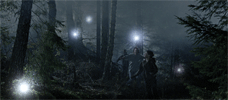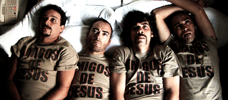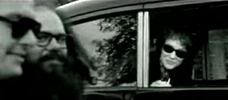Reviews
Tom Kalin
USA, 2007
Credits
Review by Tom Huddleston
Posted on 23 October 2007
Source 35mm print
Categories The Times BFI 51st London Film Festival
It is a disquieting experience to find out after the fact that the events depicted in Tom Kalin’s new film Savage Grace actually happened. The film tells the story of Barbara Daly Baekeland and her son Anthony, their extravagant lifestyle as American expatriates in Europe throughout the 1950’s and ‘60’s, their incestuous sexual relationship, and the eventual murder of the mother at the hands of the son. The film is lush, beautiful, and ultimately deeply unsettling, but never feels true. This is not a criticism: for at least the first half it seems very much like an adaptation of a classic American novel, or a slightly darker take on Wes Anderson: a crackpot upper crust family’s trials and travails around European high society. As a result, when the cracks start to widen and the true darkness at the film’s heart is revealed, the impact on the viewer is immeasurably heightened.
The story opens in postwar New York, where Barbara is cementing her position as a society doyen despite her husband Brooks’ reluctance: he’s the heir to the Bakelite fortune, she’s a reckless free spirit who just gave up on her acting ambition to raise his child. The period is exactingly recreated, but the focus is all on the characters—their already fractious relationship is thrown into sharp relief when Barbara abandons her husband and jumps into a car with the first stranger who happens past.
We shift forward to Paris, a decade later. Anthony is a shy, precocious child, emotionally chained to his mother. Barbara’s self esteem is entirely predicated on her position in society, and her emotional state is clearly fracturing, causing her to lash out at her husband and even her dinner guests. The mood here is cold, and we get a sense of where the film might be headed, into tragedy and despair.
But after another ten-year leap forward, the tone seems to lighten considerably. Anthony is now 21, educated but directionless, spending his time on the beach in Cadaques smoking dope and flirting with locals of both sexes. As played by Eddie Redmayne, Anthony is a fey, sensitive boy, still a child despite his age. His face seems bruised somehow, as though beaten into submission by a world he can’t quite relate to. And he is still obsessed with his mother, whose marital troubles are increasing exponentially in line with her neuroses.
However, despite all the looming problems, the film exudes warmth, humour and a real lightness of touch. The characters are expertly sketched and superbly played: it is here that Julianne Moore really comes into her own as Barbara, a character who, in her early scenes, seemed harsh and brittle. Barbara is a difficult character to judge, constantly, selfishly struggling for definition through her friends, her admirers, her family, her lifestyle. But Moore lends the character a likeability she perhaps doesn’t deserve, and a genuine pathos.
Moore’s finest scene - indeed, the best in the film - comes at the midpoint, when Brooks decides to abandon his family for a younger woman. Barbara tracks them to the airport, and treats her husband to a wild, vicious, hysterical rant at the checkout desk; it’s nice to see Moore let rip for a change, all Barbara’s hang-ups and frustrations spilling out for a startled public. But her real sense of loss is not for her husband, but his money and the prestige it brought. For Anthony, his father’s abandonment is inexplicable—Brooks doesn’t even write to his son, cutting himself off entirely from his erstwhile family.
Up to this point, one could almost be forgiven for viewing Savage Grace as a comedy of manners—a dark comedy, fraught with tension and riddled with incongruity, but still essentially humorous. But here things start to shift, as the characters we thought we understood begin to act out in surprising and disturbing ways—a male guest brought to the house sleeps with Anthony, then Barbara, then both of them together, in a scene which is at first comic, then poignant, and finally deeply disconcerting. Mother and son return to Paris, where Barbara attempts suicide—we watch as Anthony tenderly cleanses his mother’s ragged, sutured wrists. Then a further, final move to London, and full revelation of the horrific truth as Barbara straddles her son on the sofa, a scene played with nightmarish realism and a sense of bleakly skewed normality, as is the murder which swiftly follows.
With a knowledge of the facts behind the Baekeland case, viewing Savage Grace would be a very different experience. But for the unsuspecting viewer, there’s no sense of foreboding here, no hint at what is to come, beyond a few personality flaws and an odd sense of displacement. Even the first hints of incest are depicted almost as a game, a deepening of the connection between mother and child. The eventual descent into tragedy is shocking and powerful, and overturns every expectation, leaving the viewer shattered and spinning.
Savage Grace is a superbly designed film; from script to costumes, from characters to locations, every piece of the puzzle feels precise, considered and exact. The tone may shift wildly from scene to scene, but it never feels out of control—Kalin’s directorial hands are sure, his control over the material absolute. But it is this tonal unpredictability that may prove the film’s undoing. We never know where we stand, or what’s coming, which can be exhilarating but also frustrating—an audience might be unwilling to commit themselves emotionally to characters so unpredictable, so ultimately unknowable. However intelligent the film is - and it is, witty and sharp, beautifully observant and wonderfully sly - we are left unmoved, or rather, we are moved in so many directions that none ever manages to stick.
More The Times BFI 51st London Film Festival
-

Island of Lost Souls
2007 -

Garage
2007 -

Exodus
2007 -

Friends of Jesus
2007 -

We Want Roses Too
2007 -

The Trap
2006 -

Captain Ahab
2007 -

Shotgun Stories
2007 -

Savage Grace
2007 -

The Assassination of Jesse James by the Coward Robert Ford
2007 -

The World Unseen
2007 -

Things We Lost In The Fire
2007 -

Lions for Lambs
2007 -

Talk to Me
2007 -

Redacted
2007 -

Battle For Haditha
2007 -

Chaotic Ana
2007 -

Angel
2007 -

Juno
2007 -

Fay Grim
2006 -

Reservation Road
2007 -

I’m Not There
2007
We don’t do comments anymore, but you may contact us here or find us on Twitter or Facebook.



